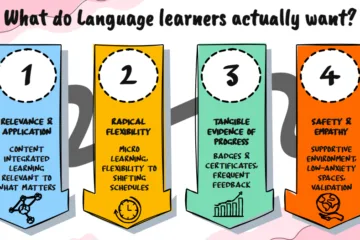L&D professionals planning corporate training initiatives need realistic expectations about language learning timelines. Overly optimistic projections lead to disappointment and abandoned programmes, whilst excessive caution delays valuable capability development unnecessarily. Understanding realistic progression timelines enables better planning, appropriate resource allocation, and achievable milestone setting.
The fluency misconception
Many businesses delay language training investments because they assume fluency requires years of intensive study. This misconception stems from confusing academic fluency (literary competence, native-like proficiency) with business fluency (effective professional communication in specific contexts).
Business languages proficiency focuses on practical communication capabilities rather than perfect accuracy or comprehensive vocabulary. Your sales team doesn’t need literary French fluency. They need confidence and competence conducting client meetings, delivering presentations, and negotiating agreements in French business contexts.
The business fluency definition
Business fluency means communicating effectively in professional contexts relevant to specific roles and industries. A procurement manager achieving business fluency in German can discuss specifications with suppliers, negotiate contracts, and resolve quality issues effectively without necessarily understanding German poetry or being able to discuss philosophy.
This focused definition enables faster capability development because corporate training concentrates on high-priority vocabulary, scenarios, and communication patterns rather than attempting comprehensive language mastery. Professional language classes that focus on business applications produce practical competence faster than academic programmes.
The 100-hour foundation
Research suggests approximately 100 hours of effective instruction builds foundational business communication competence in related European languages. This represents roughly six months of twice-weekly sessions plus reasonable practice time between lessons.
After 100 hours of targeted corporate training, participants typically can handle basic business interactions, understand straightforward professional communications, and participate in structured meetings with support. This foundation enables immediate practical application whilst continuing skill development.
The 200-hour capability
Around 200 hours of quality instruction (approximately one year of consistent twice-weekly sessions) develops intermediate business competence where participants can handle most routine professional communications independently. They conduct client meetings confidently, deliver presentations effectively, and manage typical business scenarios without constant support.
Team learning programmes that maintain consistent participation through 200 hours produce professionals who add genuine value through their language capabilities. This intermediate competence often justifies corporate training investments through measurable business improvements in international operations.
The 400-hour proficiency
Approximately 400 hours of focused language learning (roughly two years of regular instruction) builds advanced business proficiency where participants handle complex negotiations, nuanced discussions, and sophisticated professional communications with confidence and cultural appropriateness.
Corporate learning programmes that sustain engagement through 400 hours create substantial competitive advantages through truly multilingual capabilities. Professionals reaching this proficiency level often transition into international leadership roles or specialised positions requiring sophisticated language competence.
The intensity versus consistency equation
Many businesses assume intensive short-term programmes produce faster results than extended consistent learning. However, research demonstrates that regular, moderate-intensity instruction typically produces better retention and practical application than intensive immersion followed by dormant periods.
Three hours weekly for one year consistently outperforms three weeks of full-time study followed by minimal practice. Professional language classes that maintain regular engagement throughout extended periods build lasting competence more effectively than intensive crash courses.
The practice multiplier
Classroom instruction provides foundation and structure, but practical application accelerates progress substantially. Participants who regularly use developing language skills in actual business contexts progress faster than those who limit language use to formal instruction periods.
Business languages training should encourage and facilitate practical application throughout learning periods. Team members who practise with international colleagues, volunteer for multilingual assignments, or seek language-using opportunities develop competence faster whilst demonstrating immediate business value.
The plateau navigation
Language learning rarely progresses linearly. Participants experience rapid initial progress, then hit plateaus where improvement feels slow despite continued effort. These plateaus discourage many learners who abandon programmes during frustrating periods that precede breakthrough moments.
Corporate training that prepares participants for plateau experiences whilst maintaining support through difficult phases produces better long-term results. Professional instructors recognise plateaus as normal learning features rather than failure signals, helping participants maintain motivation through challenging periods.
The age advantage misconception
Many adults assume language learning becomes dramatically harder with age, discouraging them from attempting corporate training programmes. Whilst children may acquire pronunciation more easily, adults possess cognitive advantages including better learning strategies, stronger motivation, and superior analytical capabilities.
Adult professionals often progress faster in business language learning than children in academic programmes because they bring relevant context, clear objectives, and immediate application opportunities. Team learning environments that leverage adult advantages produce excellent results regardless of participant age.
The industry-specific acceleration
Professionals developing language skills within familiar industry contexts progress faster than those learning generic language content. Finance professionals learning financial vocabulary in German progress more quickly than learning everyday conversational German because they already understand the underlying concepts.
Language learning that leverages industry expertise produces faster business fluency because participants focus on relevant terminology and scenarios. Corporate training that incorporates industry-specific content accelerates progress whilst building immediately applicable capabilities.
The maintenance requirement
Language capabilities deteriorate without regular use. Professionals who develop business fluency then stop practising experience skill erosion that requires refresher training to restore. Planning for ongoing maintenance prevents capability loss that wastes initial training investments.
Corporate learning strategies should include maintenance plans that sustain capabilities after initial development programmes conclude. Regular practice opportunities, occasional refresher sessions, or ongoing advanced instruction preserve language investments whilst enabling continued skill enhancement.
The realistic expectation setting
Successful corporate training programmes set realistic expectations about timeline requirements, practice commitments, and progression patterns. Participants who understand that meaningful business fluency requires sustained effort over months or years make better-informed commitments and maintain motivation through inevitable challenges.
Professional language classes that communicate honest timelines whilst celebrating incremental progress create sustainable learning cultures. Participants appreciate transparency whilst remaining motivated through achievable milestone recognition and genuine capability development.
At The Chat Laboratory, we help European businesses develop realistic language learning timelines based on specific objectives, available resources, and participant capabilities. Our experience enables accurate progression forecasting that supports effective planning whilst maintaining achievable expectations.
Business fluency doesn’t require perfection or years of intensive study. With focused corporate training, realistic timelines, and consistent effort, professionals develop practical language capabilities that deliver measurable business value within months rather than years.



0 Comments